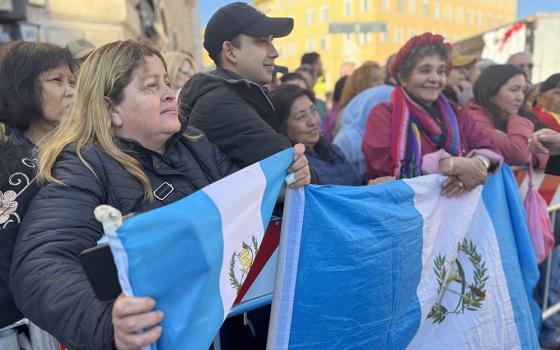Sr. Rosemary Nicholson helps children make animal masks at Madre Asunta in Tijuana, Mexico. She has worked at Instituto Madre Asunta, a shelter for migrants across the border from San Diego, since summer 2018. (Courtesy of Rosemary Nicholson)
San Diego — Sr. Rosemary Nicholson joined the Religious of Jesus and Mary at 19, moved by their lifestyle of simple living, hospitality and concern for people living in poverty.
Nicholson moved to San Diego in 1986 to work at Joan of Arc Residence, an apartment building for single working women, as an administrator.
In the summer of 2018, Nicholson started working at Instituto Madre Asunta, a shelter for migrants across the border from San Diego in Tijuana, Mexico. Twice a week, she crossed the U.S.-Mexico border to work with kids at the center, doing art projects and meeting with their parents, with the goal of helping them enjoy being children.
In November 2018, Nicholson was getting ready to cross back into the United States when a caravan of thousands of migrants arrived at the border.
Advertisement
GSR: How did the arrival of the caravan of migrants change your plans?
Nicholson: I was waiting on the road to be able to turn when buses upon buses started coming with the migrants. And for me and my companion, Sr. Natalia Mejia, who was sitting next to me, it was just so touching. We're waving and welcoming them and giving peace signals, and we just both burst into tears. It was such a profound experience.
Soon after this, the woman in charge of immigration at Catholic Charities Diocese of San Diego called me to say, "They're here."
As the caravan arrived, Catholic Charities converted one of their buildings in San Diego, previously used for retreats, into a place where migrants could seek shelter and clothing. I assisted in the preparation of this place by organizing and unpacking donations so that everything would be ready by the time migrants arrived.
What did your ministry look like once migrants had arrived?
We began doing art again with kids. Sometimes the children would color, and other times, they would make masks.
Some of the kids were shy or scared. One boy hid under the table for some time until he eventually crawled out into his dad's lap, and they colored together. The families we were working with at this time were also very open with us.
These were sacred moments. The resilience of faith that migrants have is profound.
Sister Natalia and I were very moved when the buses came to town and in the ministry that followed the arrival of the migrants. It was a transforming experience. You just feel different. You just do.
In addition to art, we also offer spiritual ministry. We would listen to mothers who were distraught and pray with 9-month-old babies, too.
What does this ministry look like now, during a pandemic?
The retreat center is no longer being used because that was for group spaces. Because of COVID-19, Catholic Charities has moved toward renting out hotel rooms for recently arrived migrant families to prevent grouping-together of people.
We would go door to door at these hotel rooms and offer to pray with families or give them a portion of Psalms that was related to journeying. No one refused us. No matter their faith or country of origin, everyone welcomed prayer.
These families are a lot more isolated now because of COVID-19. Where before, various migrant kids and parents could come together to do art or to simply be present to each other, this is no longer allowed because of COVID.
What COVID-19 protocols are in place in these hotels?
I've been pleased to see how Catholic Charities have tested migrants right away. They also offer the vaccine right away. Everyone also wears a mask and is not allowed to cluster. They deal with testing and vaccination right away because the migrants will be moving elsewhere.
There have been reports about a growing tent city in Tijuana. Could you speak to that?
A sister in Mexico said recently there are maybe 1,000 to 2,000 people in Tijuana. Many who leave their country because of danger come to these tent cities after being deported or waiting to cross and experience more danger.
There are cases where people are charging others to use the tents, tents that they themselves might have gotten for free. Or the public bathroom the government put in down there, people are charging others to use it. There are also only two bathrooms for thousands of people.
There's a lot of fear in that area. There are also reports of rape in these tent cities.
What advice would you give to young people working on immigration advocacy who are feeling burned out and need hope?
Come and see, because it changes you. Work in community; being together as a community gives you the support you need. Being with migrants transforms you. Their stories, their faith, it is hopeful. Don't give up.





